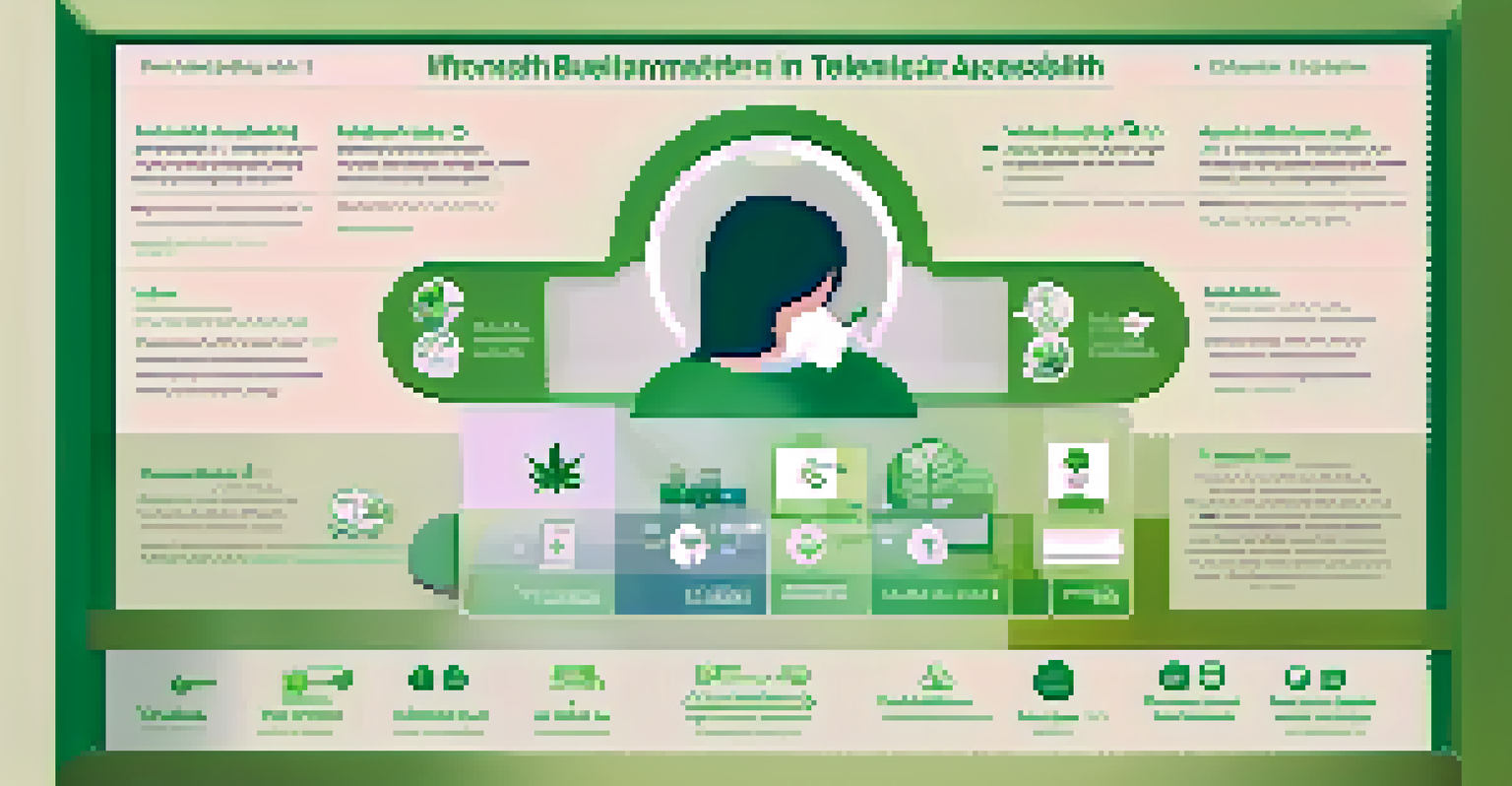Telehealth and Cannabis: Regulatory Implications for Tech

Understanding Telehealth and Its Growing Popularity
Telehealth has transformed how we access healthcare, making it more convenient and accessible. With just a few clicks, patients can consult with healthcare providers from the comfort of their homes. This shift is especially beneficial for those in remote areas or with mobility challenges, as it bridges the gap between them and essential medical services.
The future of healthcare is in telehealth, where patients can receive medical advice from the comfort of their homes.
As telehealth continues to gain traction, it's essential to understand the implications it has on various fields, including cannabis use. Patients seeking cannabis for medical purposes often require guidance and prescriptions, making telehealth a valuable resource. Through virtual consultations, healthcare providers can assess patient needs and recommend appropriate treatments, including cannabis options.
This integration of telehealth and cannabis presents unique challenges and opportunities, especially in a constantly evolving regulatory landscape. As more states legalize cannabis for medical use, understanding how telehealth fits into this equation is crucial for both providers and patients.
The Current State of Cannabis Regulations
Cannabis regulations vary widely across states, creating a complex patchwork that can confuse patients and providers alike. While some states have fully embraced cannabis for recreational and medicinal use, others maintain strict prohibitions. This inconsistency can create challenges for telehealth providers who want to offer cannabis consultations legally and ethically.

The federal landscape adds another layer of complexity, as cannabis remains classified as a Schedule I substance under the Controlled Substances Act. This classification complicates telehealth practices, as providers need to navigate both state and federal laws. Understanding these regulations is essential for tech companies developing telehealth platforms that include cannabis services.
Telehealth Enhances Healthcare Access
Telehealth provides convenient access to healthcare services, particularly for patients in remote areas or with mobility issues.
Moreover, as cannabis regulations evolve, they can significantly impact how telehealth services are provided. Tech companies must stay informed about these changes to ensure compliance and provide the best service possible to their users.
The Role of Technology in Telehealth and Cannabis
Technology plays a pivotal role in the intersection of telehealth and cannabis, enabling seamless access to healthcare services. With telehealth platforms, patients can easily connect with licensed practitioners who can evaluate their conditions and prescribe cannabis where appropriate. This accessibility can lead to better health outcomes, as patients receive timely support without the need for in-person visits.
Education is the most powerful weapon which you can use to change the world, especially when it comes to understanding cannabis.
Furthermore, advancements in technology, such as telemedicine software and mobile apps, enhance the patient experience by providing user-friendly interfaces and secure communication channels. Patients can discuss sensitive topics around cannabis use without the discomfort of an in-person consultation, which can be particularly valuable for those new to cannabis therapy.
As tech companies continue to innovate, they can create more tailored solutions that meet the specific needs of cannabis patients, such as educational resources, dosage calculators, and tracking tools. This not only empowers patients but also helps demystify cannabis use in medical settings.
Challenges in Regulatory Compliance for Telehealth
Navigating the complex regulatory environment surrounding telehealth and cannabis can be daunting for healthcare providers and tech companies alike. Compliance with state-specific regulations, licensing requirements, and prescription laws is crucial to avoid legal pitfalls. For instance, a telehealth provider licensed in one state may not legally prescribe cannabis to patients in another state, complicating the delivery of care.
Additionally, ensuring patient privacy and data security becomes paramount in this digital age. Telehealth platforms must adhere to HIPAA regulations, which safeguard patient information. Failure to comply can result in severe penalties, further complicating the already intricate relationship between telehealth, cannabis, and technology.
Cannabis Regulations Are Complex
The varying regulations surrounding cannabis create challenges for telehealth providers in delivering legal and ethical consultations.
To navigate these challenges effectively, healthcare providers and tech companies need to stay informed about regulatory changes and invest in compliance training. This proactive approach not only protects patients but also fosters trust in telehealth services.
Patient Education and Awareness in Telehealth
Patient education is vital when it comes to telehealth and cannabis, especially for those unfamiliar with the benefits and risks associated with cannabis use. Telehealth platforms can serve as valuable resources for patients, offering educational materials, FAQs, and access to knowledgeable healthcare providers. By empowering patients with information, they can make informed decisions about their health and treatment options.
Moreover, as telehealth becomes more integrated with cannabis care, it’s essential to address common misconceptions. For instance, some patients may still associate cannabis solely with recreational use, unaware of its medicinal properties. Through telehealth consultations, providers can clarify these misconceptions and help patients understand how cannabis can fit into their overall treatment plan.
This focus on education not only improves patient outcomes but also fosters a more open dialogue between patients and healthcare providers. Engaging discussions can lead to better-tailored treatment plans and increased patient satisfaction.
Future Trends in Telehealth and Cannabis Regulation
The future of telehealth and cannabis regulation is likely to be shaped by ongoing developments in both technology and legislation. As societal attitudes toward cannabis continue to shift, we can expect more states to embrace legalization, which will, in turn, create new opportunities for telehealth providers. This could lead to increased access to cannabis consultations, ultimately benefiting patients seeking alternative therapies.
Moreover, technological advancements, such as artificial intelligence and machine learning, may streamline the telehealth process, making it easier for providers to assess patient needs and recommend appropriate cannabis treatments. Imagine a future where AI assists in diagnosing conditions and suggesting tailored cannabis options, all through a telehealth interface.
Technology Drives Telehealth Innovation
Advancements in technology are crucial for integrating telehealth and cannabis, improving patient experiences and outcomes.
As these trends unfold, staying ahead of the curve will be essential for healthcare providers and tech companies alike. Embracing innovation while adhering to regulatory standards can pave the way for a more integrated and efficient approach to telehealth and cannabis care.
Conclusion: Embracing Change in Telehealth and Cannabis
As telehealth continues to evolve, it’s crucial to embrace the opportunities it presents, especially concerning cannabis care. This intersection of technology and healthcare can lead to improved patient access and outcomes, as long as providers navigate the regulatory complexities with diligence. The potential benefits of combining telehealth with cannabis are vast, from increased accessibility to personalized treatment options.
However, successful implementation requires a collaborative effort among healthcare providers, tech companies, and regulators. By working together, stakeholders can create a framework that prioritizes patient safety while promoting innovation. This collaborative spirit can help overcome challenges and lead to a more robust telehealth ecosystem.

Ultimately, staying informed, educated, and adaptable will be key for all involved in this dynamic field. With the right approach, telehealth and cannabis can work hand in hand to enhance patient care and redefine the future of healthcare.